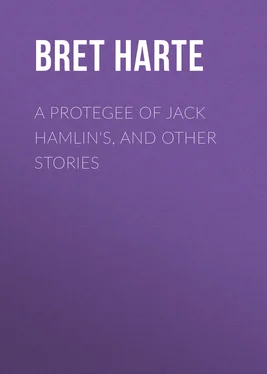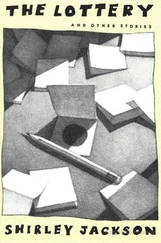Bret Harte - A Protegee of Jack Hamlin's, and Other Stories
Здесь есть возможность читать онлайн «Bret Harte - A Protegee of Jack Hamlin's, and Other Stories» — ознакомительный отрывок электронной книги совершенно бесплатно, а после прочтения отрывка купить полную версию. В некоторых случаях можно слушать аудио, скачать через торрент в формате fb2 и присутствует краткое содержание. Издательство: Иностранный паблик, Жанр: foreign_sf, literature_19, foreign_antique, foreign_prose, на английском языке. Описание произведения, (предисловие) а так же отзывы посетителей доступны на портале библиотеки ЛибКат.
- Название:A Protegee of Jack Hamlin's, and Other Stories
- Автор:
- Издательство:Иностранный паблик
- Жанр:
- Год:неизвестен
- ISBN:нет данных
- Рейтинг книги:4 / 5. Голосов: 1
-
Избранное:Добавить в избранное
- Отзывы:
-
Ваша оценка:
- 80
- 1
- 2
- 3
- 4
- 5
A Protegee of Jack Hamlin's, and Other Stories: краткое содержание, описание и аннотация
Предлагаем к чтению аннотацию, описание, краткое содержание или предисловие (зависит от того, что написал сам автор книги «A Protegee of Jack Hamlin's, and Other Stories»). Если вы не нашли необходимую информацию о книге — напишите в комментариях, мы постараемся отыскать её.
A Protegee of Jack Hamlin's, and Other Stories — читать онлайн ознакомительный отрывок
Ниже представлен текст книги, разбитый по страницам. Система сохранения места последней прочитанной страницы, позволяет с удобством читать онлайн бесплатно книгу «A Protegee of Jack Hamlin's, and Other Stories», без необходимости каждый раз заново искать на чём Вы остановились. Поставьте закладку, и сможете в любой момент перейти на страницу, на которой закончили чтение.
Интервал:
Закладка:
So the days slipped by, and although Mr. Hamlin was soon able to walk short distances, leaning on Sophy’s arm, in the evening twilight, along the river bank, he was still missed from the haunts of dissipated men. A good many people wondered, and others, chiefly of the more irrepressible sex, were singularly concerned. Apparently one of these, one sultry afternoon, stopped before the shadowed window of a photographer’s; she was a handsome, well-dressed woman, yet bearing a certain countrylike simplicity that was unlike the restless smartness of the more urban promenaders who passed her. Nevertheless she had halted before Mr. Hamlin’s picture, which Sophy had not yet dared to bring home and present to him, and was gazing at it with rapt and breathless attention. Suddenly she shook down her veil and entered the shop. Could the proprietor kindly tell her if that portrait was the work of a local artist?
The proprietor was both proud and pleased to say that IT WAS! It was the work of a Miss Brown, a young girl student; in fact, a mere schoolgirl one might say. He could show her others of her pictures.
Thanks. But could he tell her if this portrait was from life?
No doubt; the young lady had a studio, and he himself had sent her sitters.
And perhaps this was the portrait of one that he had sent her?
No; but she was very popular and becoming quite the fashion. Very probably this gentleman, who, he understood, was quite a public character, had heard of her, and selected her on that account.
The lady’s face flushed slightly. The photographer continued. The picture was not for sale; it was only there on exhibition; in fact it was to be returned to-morrow.
To the sitter?
He couldn’t say. It was to go back to the studio. Perhaps the sitter would be there.
And this studio? Could she have its address?
The man wrote a few lines on his card. Perhaps the lady would be kind enough to say that he had sent her. The lady, thanking him, partly lifted her veil to show a charming smile, and gracefully withdrew. The photographer was pleased. Miss Brown had evidently got another sitter, and, from that momentary glimpse of her face, it would be a picture as beautiful and attractive as the man’s. But what was the odd idea that struck him? She certainly reminded him of some one! There was the same heavy hair, only this lady’s was golden, and she was older and more mature. And he remained for a moment with knitted brows musing over his counter.
Meantime the fair stranger was making her way towards the river suburb. When she reached Aunt Chloe’s cottage, she paused, with the unfamiliar curiosity of a newcomer, over its quaint and incongruous exterior. She hesitated a moment also when Aunt Chloe appeared in the doorway, and, with a puzzled survey of her features, went upstairs to announce a visitor. There was the sound of hurried shutting of doors, of the moving of furniture, quick footsteps across the floor, and then a girlish laugh that startled her. She ascended the stairs breathlessly to Aunt Chloe’s summons, found the negress on the landing, and knocked at a door which bore a card marked “Studio.” The door opened; she entered; there were two sudden outcries that might have come from one voice.
“Sophonisba!”
“Marianne!”
“Hush.”
The woman had seized Sophy by the wrist and dragged her to the window. There was a haggard look of desperation in her face akin to that which Hamlin had once seen in her sister’s eyes on the boat, as she said huskily: “I did not know YOU were here. I came to see the woman who had painted Mr. Hamlin’s portrait. I did not know it was YOU. Listen! Quick! answer me one question. Tell me—I implore you—for the sake of the mother who bore us both!—tell me—is this the man for whom you left home?”
“No! No! A hundred times no!”
Then there was a silence. Mr. Hamlin from the bedroom heard no more.
An hour later, when the two women opened the studio door, pale but composed, they were met by the anxious and tearful face of Aunt Chloe.
“Lawdy Gawd, Missy,—but dey done gone!—bofe of ‘em!”
“Who is gone?” demanded Sophy, as the woman beside her trembled and grew paler still.
“Marse Jack and dat fool nigger, Hannibal.”
“Mr. Hamlin gone?” repeated Sophy incredulously. “When? Where?”
“Jess now—on de down boat. Sudden business. Didn’t like to disturb yo’ and yo’ friend. Said he’d write.”
“But he was ill—almost helpless,” gasped Sophy.
“Dat’s why he took dat old nigger. Lawdy, Missy, bress yo’ heart. Dey both knows aich udder, shuah! It’s all right. Dar now, dar dey are; listen.”
She held up her hand. A slow pulsation, that might have been the dull, labored beating of their own hearts, was making itself felt throughout the little cottage. It came nearer,—a deep regular inspiration that seemed slowly to fill and possess the whole tranquil summer twilight. It was nearer still—was abreast of the house—passed—grew fainter and at last died away like a deep-drawn sigh. It was the down boat, that was now separating Mr. Hamlin and his protegee, even as it had once brought them together.
AN INGENUE OF THE SIERRAS
I
We all held our breath as the coach rushed through the semi-darkness of Galloper’s Ridge. The vehicle itself was only a huge lumbering shadow; its side-lights were carefully extinguished, and Yuba Bill had just politely removed from the lips of an outside passenger even the cigar with which he had been ostentatiously exhibiting his coolness. For it had been rumored that the Ramon Martinez gang of “road agents” were “laying” for us on the second grade, and would time the passage of our lights across Galloper’s in order to intercept us in the “brush” beyond. If we could cross the ridge without being seen, and so get through the brush before they reached it, we were safe. If they followed, it would only be a stern chase with the odds in our favor.
The huge vehicle swayed from side to side, rolled, dipped, and plunged, but Bill kept the track, as if, in the whispered words of the Expressman, he could “feel and smell” the road he could no longer see. We knew that at times we hung perilously over the edge of slopes that eventually dropped a thousand feet sheer to the tops of the sugar-pines below, but we knew that Bill knew it also. The half visible heads of the horses, drawn wedge-wise together by the tightened reins, appeared to cleave the darkness like a ploughshare, held between his rigid hands. Even the hoof-beats of the six horses had fallen into a vague, monotonous, distant roll. Then the ridge was crossed, and we plunged into the still blacker obscurity of the brush. Rather we no longer seemed to move—it was only the phantom night that rushed by us. The horses might have been submerged in some swift Lethean stream; nothing but the top of the coach and the rigid bulk of Yuba Bill arose above them. Yet even in that awful moment our speed was unslackened; it was as if Bill cared no longer to GUIDE but only to drive, or as if the direction of his huge machine was determined by other hands than his. An incautious whisperer hazarded the paralyzing suggestion of our “meeting another team.” To our great astonishment Bill overheard it; to our greater astonishment he replied. “It ‘ud be only a neck and neck race which would get to h-ll first,” he said quietly. But we were relieved—for he had SPOKEN! Almost simultaneously the wider turnpike began to glimmer faintly as a visible track before us; the wayside trees fell out of line, opened up, and dropped off one after another; we were on the broader table-land, out of danger, and apparently unperceived and unpursued.
Nevertheless in the conversation that broke out again with the relighting of the lamps, and the comments, congratulations, and reminiscences that were freely exchanged, Yuba Bill preserved a dissatisfied and even resentful silence. The most generous praise of his skill and courage awoke no response. “I reckon the old man waz just spilin’ for a fight, and is feelin’ disappointed,” said a passenger. But those who knew that Bill had the true fighter’s scorn for any purely purposeless conflict were more or less concerned and watchful of him. He would drive steadily for four or five minutes with thoughtfully knitted brows, but eyes still keenly observant under his slouched hat, and then, relaxing his strained attitude, would give way to a movement of impatience. “You ain’t uneasy about anything, Bill, are you?” asked the Expressman confidentially. Bill lifted his eyes with a slightly contemptuous surprise. “Not about anything ter COME. It’s what HEZ happened that I don’t exackly sabe. I don’t see no signs of Ramon’s gang ever havin’ been out at all, and ef they were out I don’t see why they didn’t go for us.”
Читать дальшеИнтервал:
Закладка:
Похожие книги на «A Protegee of Jack Hamlin's, and Other Stories»
Представляем Вашему вниманию похожие книги на «A Protegee of Jack Hamlin's, and Other Stories» списком для выбора. Мы отобрали схожую по названию и смыслу литературу в надежде предоставить читателям больше вариантов отыскать новые, интересные, ещё непрочитанные произведения.
Обсуждение, отзывы о книге «A Protegee of Jack Hamlin's, and Other Stories» и просто собственные мнения читателей. Оставьте ваши комментарии, напишите, что Вы думаете о произведении, его смысле или главных героях. Укажите что конкретно понравилось, а что нет, и почему Вы так считаете.











